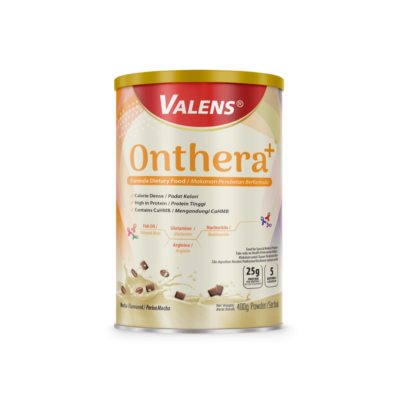This health article has been professionally reviewed by Dt Jennifer Wu, a registered dietitian of the Malaysian Dietitians’ Association (MDA).
When we think of cancer, we often view it as the ultimate battle—one that patients either win or lose against the disease itself.
However, research and clinical observations reveal a stark reality: many cancer patients do not succumb to the cancer itself but rather to malnutrition and related complications, such as cachexia, infections, and organ failure (1).
Understanding these risks and addressing them proactively can significantly impact patient outcomes and quality of life.
The Silent Threat of Malnutrition in Cancer Patients
Malnutrition is a major yet often overlooked issue in cancer care. In fact, cancer patients are among the most vulnerable to malnutrition compared to all patient groups (1).
Studies have shown that the prevalence of malnutrition in cancer patients, even in their first visit to oncological care where 40% to 80% exhibited signs of nutritional impairment, even in the early stages of disease, with gastroesophageal, pancreatic, head and neck, and colorectal cancer patients being particularly affected (2).
Untreated cancer-related malnutrition can lead to severe consequences. Malnourished colorectal cancer patients endured fewer chemotherapy cycles (3), while those with sarcopenia or malnutrition faced a higher risk of chemotherapy toxicity (4).
Furthermore, cancer causes chronic inflammation due to pro-inflammatory cytokines released from tumors or immune cells (1), which increases the body’s energy needs yet reduces the patient’s appetite. This can weaken the immune system, reduce treatment tolerance, and hinder recovery.

Cachexia is one of the biggest complications faced by most cancer patients.
Cachexia: One of the No.1 Cancer-induced Killer
One of the most severe complications of cancer-related malnutrition is cachexia—a condition characterized by extreme muscle wasting, weight loss, and metabolic disturbances that cannot be resolved with conventional dietary changes alone (5).
It affects up to 50–80% of advanced cancer patients and is responsible for nearly 20% of cancer-related deaths (6). Cachexia not only reduces the body’s strength but also impairs the effectiveness of cancer treatments, making recovery even more challenging.
Other Cancer-Related Complications
Besides malnutrition and cachexia, cancer patients often face other complications that contribute to mortality, including:
- Infections: A weakened immune system increases susceptibility (7).
- Organ Dysfunction: Cancer and its treatments can place extreme stress on vital organs such as kidney and liver (8).
- Blood Clots: Cancer patients have a higher risk of developing blood clots, which can lead to life-threatening conditions like pulmonary embolism (9).
The Importance of Nutritional and Supportive Care
Addressing malnutrition and its complications early can significantly improve outcomes for cancer patients, such as,
Medical Nutrition Therapy: Tailored medical grade nutritional interventions used by healthcare professionals to meet the patient’s condition and dietary needs.
Immunonutrition is a type of nutritional therapy often used to improve cancer patient’s wellbeing as it has been shown to lower the risk of complications and death, as well as shorten hospital stays (10).
Supplementation: Oral nutritional supplements, enteral, or parenteral nutrition support when dietary intake is insufficient.
Exercise and Rehabilitation: Maintaining muscle mass and strength through light physical activity.
Early Screening and Intervention: Regular nutritional assessments to identify patients at risk of malnutrition or cachexia.

Regular dietary assessment with a dietitian or a healthcare provider can help to prevent and mitigate risk of cancer-related malnutrition.
A Paradigm Shift in Cancer Care
Shifting the focus beyond tumor treatment to holistic patient care—including nutrition, symptom management, and supportive therapies—can significantly enhance survival rates and quality of life for cancer patients.
Healthcare providers such as Dietitians and Doctors, as well as caregivers, must recognize the role of malnutrition and complications in cancer mortality, and take proactive steps to mitigate these risks.
By addressing malnutrition and its complications, we can improve cancer patients’ resilience, treatment outcomes, and overall well-being. The battle against cancer is not just about fighting the disease, but about supporting the body throughout the journey.
References
- Ryan, A. M., Power, D. G., Daly, L., Cushen, S. J., Ní Bhuachalla, Ē., & Prado, C. M. (2016). Cancer-associated malnutrition, cachexia and sarcopenia: the skeleton in the hospital closet 40 years later. The Proceedings of the Nutrition Society, 75(2), 199–211. https://doi.org/10.1017/S002966511500419X
- Muscaritoli, M., Lucia, S., Farcomeni, A., Lorusso, V., Saracino, V., Barone, C., Plastino, F., Gori, S., Magarotto, R., Carteni, G., Chiurazzi, B., Pavese, I., Marchetti, L., Zagonel, V., Bergo, E., Tonini, G., Imperatori, M., Iacono, C., Maiorana, L., Pinto, C., … PreMiO Study Group (2017). Prevalence of malnutrition in patients at first medical oncology visit: the PreMiO study. Oncotarget, 8(45), 79884–79896. https://doi.org/10.18632/oncotarget.20168
- Aaldriks, A. A., van der Geest, L. G., Giltay, E. J., le Cessie, S., Portielje, J. E., Tanis, B. C., Nortier, J. W., & Maartense, E. (2013). Frailty and malnutrition predictive of mortality risk in older patients with advanced colorectal cancer receiving chemotherapy. Journal of geriatric oncology, 4(3), 218–226. https://doi.org/10.1016/j.jgo.2013.04.001
- Prado, C. M., Cushen, S. J., Orsso, C. E., & Ryan, A. M. (2016). Sarcopenia and cachexia in the era of obesity: clinical and nutritional impact. The Proceedings of the Nutrition Society, 75(2), 188–198. https://doi.org/10.1017/S0029665115004279
- Fearon, K., et al. (2011). Definition and classification of cancer cachexia: An international consensus. The Lancet Oncology, 12(5), 489-495. https://doi.org/10.1016/S1470-2045(10)70218-7
- Arends, J., Muscaritoli, M., Anker, S., Audisio, R., Barazzoni, R., Bosnjak, S., Bossi, P., Bowman, J., Gijssels, S., Krznarić, Ž., Strasser, F., & Aapro, M. (2023). Overcoming barriers to timely recognition and treatment of cancer cachexia: Sharing Progress in Cancer Care Task Force position paper and call to action. Critical Reviews in Oncology/Hematology, 185, 103965. https://doi.org/10.1016/j.critrevonc.2023.103965
- Canadian Cancer Society. (n.d.). The immune system and cancer. Retrieved March 7, 2025, from https://cancer.ca/en/cancer-information/what-is-cancer/immune-system
- Anand, U., Dey, A., Chandel, A. K. S., Sanyal, R., Mishra, A., Pandey, D. K., De Falco, V., Upadhyay, A., Kandimalla, R., Chaudhary, A., Dhanjal, J. K., Dewanjee, S., Vallamkondu, J., & Pérez de la Lastra, J. M. (2022). Cancer chemotherapy and beyond: Current status, drug candidates, associated risks and progress in targeted therapeutics. Genes & diseases, 10(4), 1367–1401. https://doi.org/10.1016/j.gendis.2022.02.007
- Poenou, G., Dumitru Dumitru, T., Lafaie, L., Mismetti, V., Ayoub, E., Duvillard, C., Accassat, S., Mismetti, P., Heestermans, M., & Bertoletti, L. (2022). Pulmonary Embolism in the Cancer Associated Thrombosis Landscape. Journal of clinical medicine, 11(19), 5650. https://doi.org/10.3390/jcm11195650
- Ma, X., Pei, B., Wu, N., Wang, C., Yu, Y., & Yang, W. (2024). Current research and future prospects of immunonutrition in gastrointestinal malignancies. Frontiers in immunology, 15, 1420415. https://doi.org/10.3389/fimmu.2024.1420415









